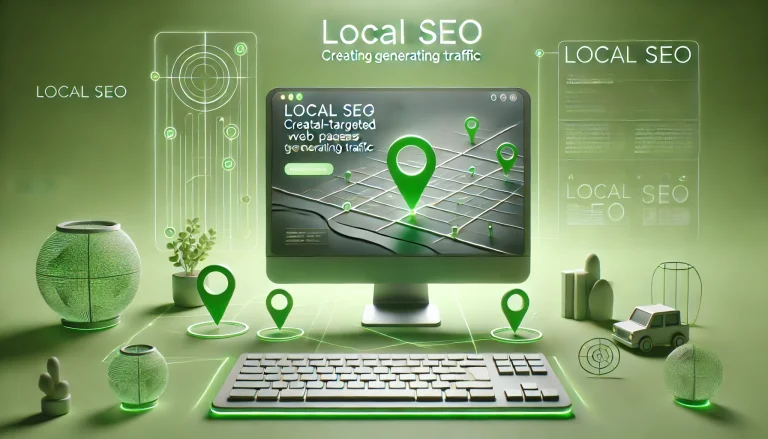Creating city pages for service area businesses can be a game-changer for local SEO, driving targeted traffic and improving search rankings. By focusing on specific locations, businesses can position themselves as the go-to provider for services in that area. Below, we will delve deeper into the creation process with examples and real-world case studies to demonstrate how city pages can help your service area business grow.
FAQs
- What’s the difference between city pages and location pages?
City pages target a specific city or neighborhood, while location pages may cover broader areas or multiple cities. - Why should I use city pages for my service business?
City pages help target local customers and improve visibility in search engine results for location-based queries. - How do I avoid duplicate content on city pages?
Each city page should feature unique content, tailored to the services and needs of that specific location. - How can I optimize my city pages for mobile?
Ensure that your city pages are mobile-friendly by using responsive design, optimizing images, and reducing page load time. - How often should I update my city pages?
Regularly update city pages with fresh content, reviews, and seasonal promotions to keep them relevant and engaging. - How do I track the success of my city pages?
Use tools like Google Analytics to monitor traffic, conversions, and bounce rates for each city page.
What Are City Pages?
City pages are dedicated web pages that cater specifically to a particular city or geographic location within your service area. Each page typically includes localized content related to the services your business provides in that specific city, making it easier for search engines to rank your business for location-specific keywords.
Example: City Pages for a Cleaning Service
Consider a cleaning service that operates in multiple cities. Instead of just having a general “Cleaning Services” page, they create separate pages for each city they serve. Each page highlights:
- Local customer reviews from that city
- Specific services available in that city (e.g., residential, office, or specialized cleaning)
- Testimonials from clients in that city
- Localized content (mentioning nearby landmarks or events)
Why it works: Search engines like Google will see that your business has detailed, relevant content for each location, improving the chances of ranking for keywords like “cleaning services in [City].”
Importance of City Pages for Service Area Businesses
City pages help service area businesses stand out in a crowded online marketplace. By targeting specific areas, you can rank higher for local search queries, increase visibility, and attract customers in cities where your business operates.
Real-World Case Study: How City Pages Boosted Local SEO for a Plumber
Let’s look at a plumbing business, “Super Plumbers,” based in Atlanta, Georgia, that used city pages to increase their local SEO rankings.
- Before city pages: Super Plumbers only had one page listing their services in Atlanta. The page mentioned they served various neighborhoods but didn’t target any specific areas.
- After city pages: The company created separate city pages for neighborhoods like Buckhead, Midtown, and Downtown. Each page included:
- Detailed descriptions of the plumbing services they offer in that area
- Local testimonials from customers in each neighborhood
- Content about local building codes and plumbing regulations specific to that neighborhood
- Mention of local landmarks and high-demand plumbing services
Results:
- Super Plumbers’ rankings improved dramatically in Google’s Local Pack.
- They saw a 40% increase in organic traffic from Atlanta and its neighborhoods within three months.
- Customer inquiries grew as people felt the business understood their local plumbing needs.
This case study highlights the importance of creating tailored city pages to capture local traffic and improve rankings in specific areas.
Steps to Create Effective City Pages
Here’s a step-by-step guide, complete with examples, to help you create city pages that will boost your local SEO.
1. Research Your Service Areas
Before diving into city page creation, research and analyze the cities you serve. Choose cities based on demand for your services, local competition, and population size.
Example: Service Area for a Landscaping Business
A landscaping company that offers services in several areas may target cities like San Diego, La Jolla, and Oceanside. Each city page will emphasize services like lawn care, tree trimming, and garden design, but will highlight specific needs in each city:
- San Diego: Focus on drought-resistant landscaping due to the city’s dry climate.
- La Jolla: Promote high-end landscaping services, given the affluent population.
- Oceanside: Emphasize beachside landscaping with salt-resistant plants.
Result: This segmentation allows the landscaping business to tailor its services and content to each location, improving SEO for each city.
2. Keyword Research for City Pages
Conducting keyword research specific to each city is crucial for SEO success. Use tools like Google Keyword Planner, Ahrefs, or SEMrush to identify the best keywords for each city. Look for local search terms such as “[service] in [city]” or “[service] near me.”
Case Study: Roofing Business
A roofing business, “Skyline Roofing,” served multiple cities in Florida. They created city-specific pages and conducted keyword research for each location. For instance:
- “Roofing services in Miami” had a high search volume.
- “Affordable roofing contractors in Fort Lauderdale” was another keyword they targeted.
By including these keywords in titles, meta descriptions, and throughout their city-specific content, Skyline Roofing ranked higher for each city.
Result: They saw a 25% increase in organic leads from the targeted city pages.
On-Page Optimization for City Pages
Once you’ve created your city pages, optimize them for both users and search engines. Use these tips:
1. Localized Titles and Metadata
Each city page should have a unique title and meta description. Include the city name and the service provided to improve click-through rates and search rankings.
Example: Title for a City Page
“Top-Rated Plumbing Services in Buckhead | Super Plumbers”
Meta Description: “Looking for expert plumbing services in Buckhead? Super Plumbers offers reliable and affordable plumbing solutions for homes and businesses in Buckhead, Georgia.”
2. Structured Data for Local SEO
Use schema markup to tell search engines where your business is located. This helps your city pages appear in rich snippets and Google’s Local Pack, increasing visibility.
Case Study: Local Bakery
A local bakery in Chicago, “Sweet Treats,” used schema markup on their city pages to provide details like their business name, address, phone number, and operating hours. By structuring this data correctly, they appeared in the Local Pack for search terms like “best cupcakes in Chicago.”
Design and User Experience Considerations
A well-designed city page is not just about aesthetics—it also impacts your page’s performance and conversion rates.
1. Visual Content and Local Imagery
Incorporating local images or relevant visual content can make your city pages more engaging. Use images of your service areas, local landmarks, or photos of your work in that city.
Example: A Pest Control Business
A pest control company in Los Angeles included images of their team working in well-known LA neighborhoods. By showing their technicians in front of famous landmarks, they made their content more relatable and visually appealing.
Result: This helped them engage users better and increased the time visitors spent on the site, improving their rankings.
2. Internal Linking and Navigation
Ensure city pages are easily accessible from other parts of your site. Use internal links to guide users to related pages, such as blog posts, service details, or contact forms.
Example: An HVAC company with service pages for different areas linked between their city pages and blog articles like “How to Prepare Your Home for Summer Heat in [City].”
Result: Internal linking increased site engagement and reduced bounce rates, contributing to better SEO performance.
How to Promote and Maintain City Pages
Creating city pages is only half the battle; the other half is maintaining them and ensuring they continue to rank well.
1. Local Reviews and Testimonials
Encourage customers to leave reviews on Google and other review sites. Feature these reviews prominently on each city page to build trust and social proof.
Case Study: Local Car Wash
A car wash in Seattle created a city page dedicated to each neighborhood they served. They encouraged customers in each area to leave reviews, which were featured on their respective city pages. These reviews helped the business stand out as the most trusted car wash in Seattle’s different neighborhoods.
Result: The business saw a significant increase in conversions from city-specific traffic.
Common Mistakes to Avoid in City Pages
Even though city pages are powerful, there are pitfalls that businesses often fall into. Here are a few mistakes to avoid:
1. Duplicate Content Issues
Google penalizes websites with duplicate content. Each city page should be unique, with content that is tailored to that location.
Example: A cleaning service that simply copied and pasted the same content for each city page will not rank well. It’s crucial to write fresh, localized content for each page.
2. Over-Optimization (Keyword Stuffing)
While it’s important to include city-specific keywords, avoid stuffing them into your content unnaturally. Focus on creating engaging, useful content that incorporates keywords naturally.
Conclusion
City pages are a powerful tool for service area businesses looking to target specific locations and improve their local SEO. By tailoring content, conducting keyword research, and optimizing for each city, businesses can enhance their online visibility, engage with local customers, and ultimately drive more conversions.


